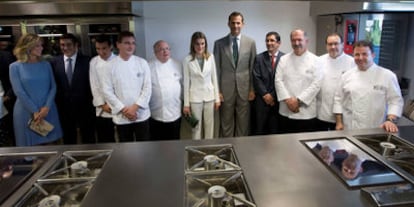Cooking on campus
With the opening of the Basque Culinary Center, the sector now has a university
Spain's first food university was inaugurated on Monday before a large attendance of representatives from politics, business and culture. Crown Prince Felipe and his wife Letizia headed the ceremony in San Sebastián, home of a new learning institution called the Basque Culinary Center (BCC), which for the first time raises food science to university level. The campus includes the School of Gastronomic Science of Mondragón University as well as facilities for culinary research and development.
The idea for the BCC was born in 2007 as a way to create a world-class research center in a region that has long been a global reference point for new culinary trends. Chefs such as Juan Mari Arzak, Martín Berasategui and Pedro Subijana, who, along with their Catalan colleagues - Ferran Adrià and company - helped push Spain to the top of the world gastronomy charts, wanted the learning of an entire generation to be passed on through an institution of higher learning. It seemed only fitting that the headquarters for this new center should be San Sebastián, the city with the most Michelin stars per capita.
"It's taking cuisine and gastronomy to the world of learning," said Joxe Mari Aizega, BCC director.
Government and business threw their weight behind this venture, which raised 17.1 million euros in investment from institutions including the Basque government, the Spanish Ministry of Science and Innovation and appliance manufacturer Fagor.
On October 3, 56 students will start taking courses at the BCC and go on to become the first graduating class four years from now, as well as the first generation of chefs with a college degree. The BCC's director of academic studies, Alex Beitia, said that the center's educational model represents a change of paradigm in the approach to teaching. "There won't be lectures where the student has to follow the professor's guidelines, but instead students will take the reins of their own training and the instructor will be there to accompany them," he said.
The center favors a hands-on approach, and by week three students will be practicing at the BCC's cafeteria; later on they will train at some of the best restaurants in the Basque region and elsewhere.
Worldwide greats
A "dream team" of world-renowned chefs makes up the advisory board of the BCC, including its chairman Adrià and Michel Bras (France), René Redzepi (Denmark), Gastón Acurio (Peru), Alex Atala (Brazil), Dan Barber (USA), Heston Blumenthal (Great Britain), Massimo Bottura (Italy) and Yukio Hattori (Japan). All of them will also give lectures at the center.
Located on a 12,000-square-meter area inside the Miramón industrial park, the building is a white, five-story affair that attempts to represent a pile of plates. Its U shape divides the space in two distinct areas: one for academic studies and the other for practical applications.
The 56 students of ages between 18 and 25 who were admitted for this first year hail mostly from Spain, with six aspiring chefs from other countries (Mexico, Colombia, China, France, Romania and Venezuela). Broken down by gender, 57 percent are male and 43 percent female. Admission criteria included a test, spoken languages and an essay explain their personal motivation. Students all underscored "the historical responsibility of being the first generation," and there is already a waiting list of 400 applications for next year.
Prince Felipe said that the center's goals - training, research, innovation and international exposure - "show us the way out of the crisis," after greeting his audience with a phrase in Basque: "Zorionak proiektu honegatik," or "Congratulations on this project."

Tu suscripción se está usando en otro dispositivo
¿Quieres añadir otro usuario a tu suscripción?
Si continúas leyendo en este dispositivo, no se podrá leer en el otro.
FlechaTu suscripción se está usando en otro dispositivo y solo puedes acceder a EL PAÍS desde un dispositivo a la vez.
Si quieres compartir tu cuenta, cambia tu suscripción a la modalidad Premium, así podrás añadir otro usuario. Cada uno accederá con su propia cuenta de email, lo que os permitirá personalizar vuestra experiencia en EL PAÍS.
¿Tienes una suscripción de empresa? Accede aquí para contratar más cuentas.
En el caso de no saber quién está usando tu cuenta, te recomendamos cambiar tu contraseña aquí.
Si decides continuar compartiendo tu cuenta, este mensaje se mostrará en tu dispositivo y en el de la otra persona que está usando tu cuenta de forma indefinida, afectando a tu experiencia de lectura. Puedes consultar aquí los términos y condiciones de la suscripción digital.








































